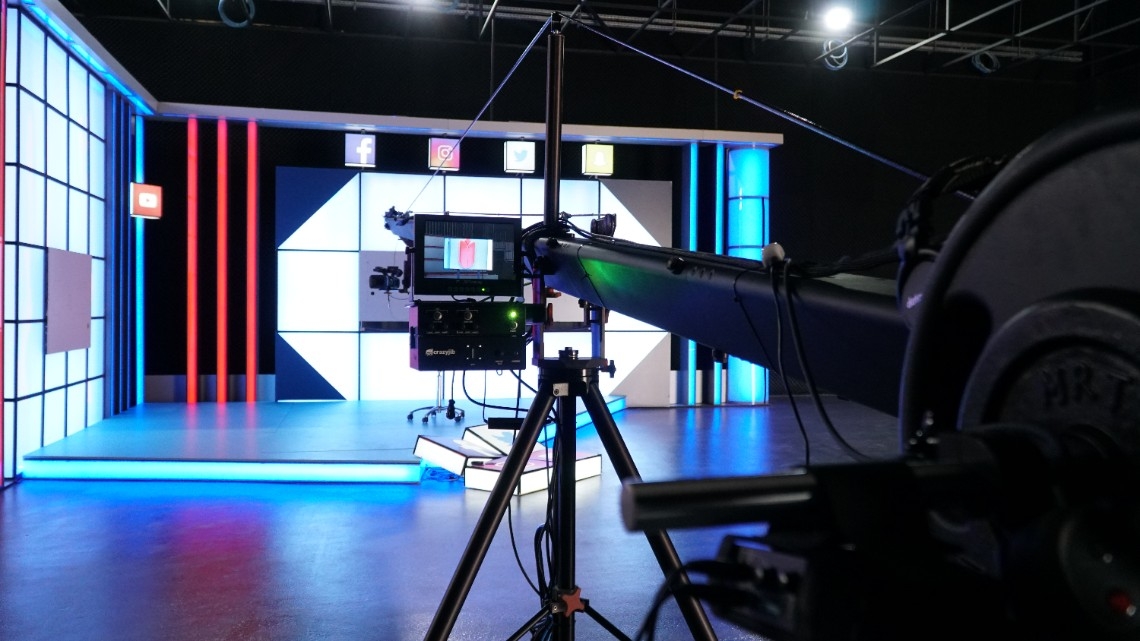


In an increasingly digitalized world, communication is at the center of all industries and institutions. The dissemination of new media tools is changing societies and forcing transformation. While it raises various industry-specific expectations, it also imposes some communication requirements on all business areas. With this awareness, Ibn Haldun University's Master's Program in New Media and Communication provides theoretical information on new media and communication with practical applications to meet industry-specific expectations and requirements and meet the field's academic needs. Students enrolled in the program will be involved by completing theoretical and practical courses at the Master's level for one year.
Assoc. Prof. Mehmet Karanfiloğlu
Our program includes the theoretical background of media within the historical development, recent media and communication theories, research principles, methodology, digital communication, culture and society, and practical applications that meet the needs and expectations of the industry. The program is taught in English. The areas of knowledge and skills that our students who proceed to the Master's level acquire after the program are as follows:
| IBN HALDUN UNIVERSITY SCHOOL OF GRADUATE STUDIES NEW MEDIA AND COMMUNICATION (IN ENGLISH) WITH THESIS PROGRAM COURSE PLAN |
|||||
| 1. Semester | |||||
| Course Code | Course Name | T | U | K | ECTS |
| NMC 501 | Research Methods in New Media | 3 | 0 | 3 | 8 |
| NMC 503 | History and Trends in Digital Media | 3 | 0 | 3 | 8 |
| NMC … | Departmental/General Elective | 3 | 0 | 3 | 8 |
| NMC … | Departmental/General Elective | 3 | 0 | 3 | 8 |
| Language Courses | |||||
| Total Credit | 12 | 32 | |||
| 2. Semester | |||||
| Course Code | Course Name | T | U | K | ECTS |
| NMC 500 | Seminar | 3 | 0 | 0 | 5 |
| NMC 502 | Digital Media and Cultural Exchange | 3 | 0 | 3 | 8 |
| NMC 504 | New Media and Social Issues | 3 | 0 | 3 | 8 |
| NMC … | Departmental Elective | 3 | 0 | 3 | 8 |
| NMC … | Departmental Elective | 3 | 0 | 3 | 8 |
| Language Courses | |||||
| Total Credit | 12 | 37 | |||
| 3. Semester | |||||
| Course Code | Course Name | T | U | K | ECTS |
| NMC 599 | Master’s Thesis | 0 | 0 | 0 | 30 |
| Language Courses | |||||
| Total Credit | 0 | 30 | |||
| 4. Semester | |||||
| Course Code | Course Name | T | U | K | ECTS |
| NMC 599 | Master’s Thesis | 0 | 0 | 0 | 30 |
| Language Courses | |||||
| Total Credit | 0 | 30 | |||
| Overall Total Credit | 24 | 129 | |||
| REQUIRED COURSES | |||||
| Course Code | Course Name | T | U | K | ECTS |
| NMC 500 | Seminar | 3 | 0 | 0 | 5 |
| NMC 501 | Research Methods in New Media | 3 | 0 | 3 | 8 |
| NMC 502 | Digital Media and Cultural Exchange | 3 | 0 | 3 | 8 |
| NMC 503 | History and Trends in Digital Media | 3 | 0 | 3 | 8 |
| NMC 504 | New Media and Social Issues | 3 | 0 | 3 | 8 |
| DEPARTMENTAL ELECTIVE COURSES | |||||
| Course Code | Course Name | T | U | K | ECTS |
| NMC 511 | Social Media Productions | 3 | 0 | 3 | 8 |
| NMC 512 | Writing for the Web and Digital Media | 3 | 0 | 3 | 8 |
| NMC 513 | Media and Convergence | 3 | 0 | 3 | 8 |
| NMC 514 | Economy of Journalism on Mobile Networks | 3 | 0 | 3 | 8 |
| NMC 515 | Data Culture | 3 | 0 | 3 | 8 |
| NMC 516 | New Media and Communication Theories | 3 | 0 | 3 | 8 |
| NMC 517 | Global Digital Cultures | 3 | 0 | 3 | 8 |
| NMC 518 | New Media and Ethics | 3 | 0 | 3 | 8 |
| NMC 519 | Social Media Management | 3 | 0 | 3 | 8 |
| NMC 520 | Psychology of Digital Media | 3 | 0 | 3 | 8 |
| NMC 522 | International Communication | 3 | 0 | 3 | 8 |
| NMC 523 | Perception Management | 3 | 0 | 3 | 8 |
| NMC 524 | Digital Diplomacy | 3 | 0 | 3 | 8 |
| NMC 525 | Digital Content Strategies | 3 | 0 | 3 | 8 |
| NMC 526 | Digital Storytelling | 3 | 0 | 3 | 8 |
| NMC 527 | Communication Policy and Law | 3 | 0 | 3 | 8 |
| NMC 528 | Generations, New Media, and Strategic Communication | 3 | 0 | 3 | 8 |
| NMC 529 | Political Communication | 3 | 0 | 3 | 8 |
mcom@ihu.edu.tr